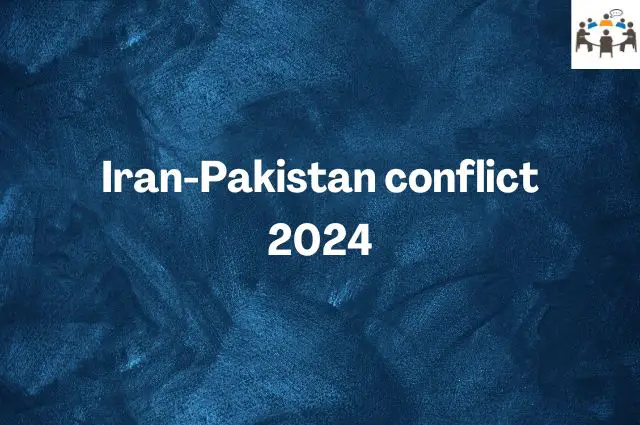Theme:
- The relationship between Iran and Pakistan has long been complex and marked by periods of both cooperation and tension. Recently, in January 2024, the tensions reached a new peak with cross-border military strikes between the two countries.
Recent events:
- On January 3, 2024, Iran was bombed in Kerman, killing 94 people. Iran accused Pakistan of harbouring a jihadist group that was responsible for the attack.
- On January 16, 2024, Iran launched missile strikes into Pakistan’s Balochistan province, targeting alleged hideouts of the Jaish al-Adl insurgent group.
- Pakistan perceived the Iranian attack as a direct violation of its sovereignty and retaliated with air strikes on Iran.
- News came on January 27, 2024, that gunmen killed nine Pakistani nationals in southeastern Iran. This incident occurred after Pakistan and Iran agreed to carry out diplomatic talks to prevent further escalation.
- On 28th January 2024, Iran and Pakistan said they respected each other’s sovereignty and patched up.
Iran-Pakistan relations:
- Iran became the first country to recognize Pakistan’s independence after the partition of British India, establishing a strong initial bond.
- Iran supported Pakistan in the Indo-Pakistani wars of 1965 and 1971.
- The Iranian Revolution in 1979 marked a significant shift in Pakistan’s relationship with Iran, with Pakistan recognizing the new Islamic Republic while maintaining concerns about its ideology.
- Both countries supported opposing sides in the Iran-Iraq War, further straining their relationship, and their diverging interests in Afghanistan, with Pakistan backing the Taliban and Iran supporting the Northern Alliance that was aimed to resist the Taliban, creating additional friction.
Reasons for the conflict in 2024:
- Pakistan accommodated jihadist elements that had previously received support from Pakistan’s intelligence agency, the Inter-Services Intelligence (ISI), particularly during the Soviet-Afghan War in the 1980s.
- Over time, some of these jihadist groups morphed into entities with broader agendas, and their activities extended beyond regional conflicts. Jaish al-Adl, or its predecessor Jaish al-Jihad, had emerged during this period.
- Jaish al-Adl envisions an independent Baloch state encompassing areas in both Iran and Pakistan.
- Jaish al-Adl views the Iranian government as oppressive and responsible for the problems faced by the Baloch people. They have carried out numerous attacks against security forces and officials, often claiming them as retaliation for government actions.
- Iran has accused Pakistan multiple times in the past of providing a safe haven and logistical support to Jaish al-Adl, allowing them to operate with impunity and launch attacks on Iranian
- According to experts, this is seen as a way for Pakistan to exert pressure on Iran regarding regional issues, such as attempting to undermine Iran’s economic cooperation with India or reduce Iran’s influence in Afghanistan.
Effects of the conflict:
- The conflict between Iran and Pakistan has the potential to escalate regional proxy wars, particularly in the already volatile Middle East.
- The cross-border military strikes threaten the stability of the Iran-Pakistan border region. Escalating hostilities and military actions can lead to increased security risks, displacement of local populations, and a potential humanitarian crisis, affecting the lives of those residing in the border areas.
- India has strategic interests in the development of the Chabahar Port in Iran, which provides a crucial trade route bypassing Pakistan. The conflict may impact India’s plans for Chabahar, potentially delaying or altering its development.
- It may affect initiatives such as the International North-South Transport Corridor (INSTC) and other connectivity projects, hindering India’s broader regional engagement goals.
Conclusion:
The recent military strikes between Iran and Pakistan highlight both current challenges and historical complexities. Now, the patch-up after tit-for-tat strikes does not just benefit the involved nations but holds significance for the entire region.
Your Turn…
What are your thoughts on the Iran-Pakistan tensions? Express your views through the comment section below. Subscribe to our blog to read answers to the trending GD topics.
References:
- https://youtu.be/WIj96JpZKFo?si=xZLLQZD6lubOVQ-F
-
Can Iran and Pakistan forge a new strategy to quell Balochistan unrest?
-
JAA, BLF, BLA: Who are the militant groups Iran, Pakistan have hit in cross-border strikes
- Making Sense of Iran-Pakistan Cross-Border Strikes
- Iran identifies suspected bomb-maker behind twin blasts, arrests 35 people
-
Iran leader vows harsh response to deadly bombings that killed 84
Copyright @ Group Discussion Ideas. Topic suggested by Kachendra.

